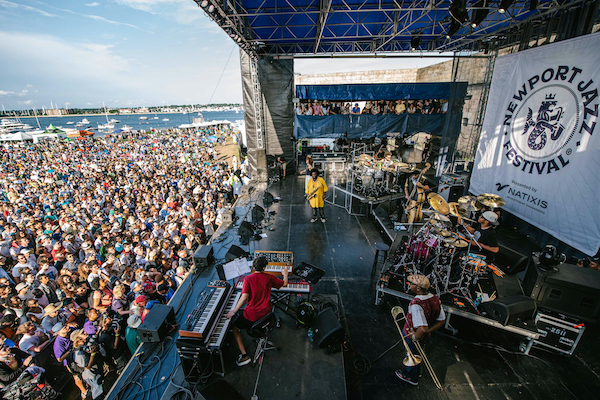Jan 13, 2026 2:09 PM
More Trump-Kennedy Center Cancellations
The fallout from the renaming of the John F. Kennedy Center for the Performing Arts to include President Donald…

Saxophonist Kamasi Washington performs during the 2019 Newport Jazz Festival in Newport, Rhode Island.
(Photo: Corwin Wickersham/Newport Jazz Festival)In the surprisingly intimate interviews, jazz celebrities like Diana Krall, Kamasi Washington, Nicholas Payton and Terri Lyne Carrington spoke warmly of their festival experiences—their first time on the stage, the musicians they played with, their interactions with Wein. Speaking last, DIVA Orchestra founder Sherrie Maricle summed up why the event is such a meaningful gig to her and her peers: “It’s the most revered stage that any jazz player can be on—it’s the jazz mecca. The goosebumps that arise ... .”
Musicians like these, whose careers so suddenly had been upended by the pandemic, stood at the forefront of Sweet’s concerns. As early as March, he said, it had become clear that some of the artists who play the festivals each year were facing trouble.
“Before we even knew that we were going to cancel, we had an artist reach out to say that they didn’t think they’d be able to play the festival this year,” he recalled. “At that point, we still thought that all would be back to normal by the end of the summer. When I asked why, they said that they were worried about just staying afloat, that soon they’d have to go on food stamps.”
In response to stories like these, on March 30, Sweet announced the formation of the Newport Festivals Musicians Relief Fund, a pool of money from which the foundation would issue grants of $300 to $1,500, depending on need, to any musician who’s ever played the festival during its decadeslong history. To fund these grants, the foundation repurposed money previously allocated to the Newport Jazz Festival’s music education program; most music education programs that the foundation supports had been canceled anyway, Sweet said.
“We burned through that initial budget within a week,” he went on, adding that further donations have helped to replenish the fund. To date, the program has given financial support to about 400 artists and distributed around $200,000 in grant money.
Sweet also invited each musician booked for this year’s festival to return next year. “So far, everyone has committed to coming back in 2021,” he said.
“The difficulty is that the tap has run dry,” Sweet asserted. “If Congress doesn’t pass a relief package, there is nothing on the horizon to save musicians from massive economic insolvency.”
Sweet said the Save Our Stages Act and the Restart Act, two pieces of legislation pending in Congress, could help small performing arts organizations—and the musicians they support—to remain in operation. Often in competition with global music promoters, like Live Nation Entertainment and AEG Worldwide, these important smaller players in the live-music business are struggling to survive during the crisis.
If it continues much longer, “there will be almost no competition left for those two entities,” Sweet predicted, going on to claim that within “the next three to four months, 90 percent of all live independent music venues could be gone.”
Amid all of these financial and legislative concerns, Sweet also harbored personal regret about the festival’s cancellation: “To miss out on doing a festival for George this year—that’s actually one of the hardest parts about this. We don’t know how many more he’ll get to see.”
But in the March press release, Sweet had invoked the Rhode Island state motto—“Hope”—as a watchword for the festival.
“Hope is what music gives to people,” he said. “Without music, what we’re going through now would be that much harder. From the 10,000-foot view, that’s our mission now.”
This story originally was published in the October 2020 issue of DownBeat. Subscribe here.

Belá Fleck during an interview with Fredrika Whitfield on CNN.
Jan 13, 2026 2:09 PM
The fallout from the renaming of the John F. Kennedy Center for the Performing Arts to include President Donald…

Peplowski first came to prominence in legacy swing bands, including the final iteration of the Benny Goodman Orchestra, before beginning a solo career in the late 1980s.
Feb 3, 2026 12:10 AM
Ken Peplowski, a clarinetist and tenor saxophonist who straddled the worlds of traditional and modern jazz, died Feb. 2…

The success of Oregon’s first album, 1971’s Music Of Another Present Era, allowed Towner to establish a solo career.
Jan 19, 2026 5:02 PM
Ralph Towner, a guitarist and composer who blended multiple genres, including jazz — and throughout them all remained…

Rico’s Anti-Microbial Instrument Swab
Jan 19, 2026 2:48 PM
With this year’s NAMM Show right around the corner, we can look forward to plenty of new and innovative instruments…

Richie Beirach was particularly renowned for his approach to chromatic harmony, which he used to improvise reharmonizations of originals and standards.
Jan 27, 2026 11:19 AM
Richie Beirach, a pianist and composer who channeled a knowledge of modern classical music into his jazz practice,…